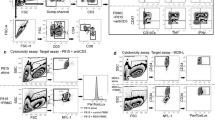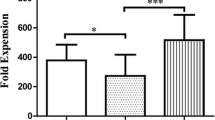Abstract
Monoclonal antibodies to the CD3 component of the T-cell antigen receptor can trigger antigen-specific cytotoxic T cells to elicit nonantigen-specific cytotoxicity, possibly by mimicking or bypassing the requirement for antigen triggering. We have used this technique to investigate the possible presence ofin vivo primed cytotoxic T cells, of unknown antigen specificity, in peripheral blood of patients with inflammatory bowel disease. Peripheral blood lymphocytes, which were depleted of background natural killer (NK) activity (CD16−), from patients with Crohn's disease exhibited significantly enhanced levels of anti-CD3-triggered T-cell cytotoxicity compared with lymphocytes from normal subjects. Enhanced lytic activity was also found in some patients with ulcerative colitis and in patients with ulcerative colitis postcolectomy. These results were not influenced by treatment or disease activity. There was no correlation between the anti-CD3-triggered T lytic activity and the NK activity in normal subjects or in patients with inflammatory bowel disease. The surface antigen phenotype of the anti-CD3-triggered T killer cell was CD3+, CD8+, CD16−, and Leu 7+. The results provide indirect evidence for increased activity of a subpopulation of cytotoxic T cells, of unknown antigen specificity, in inflammatory bowel disease. Increased activity in patients with ulcerative colitis postcolectomy suggests that this might reflect a fundamental immunological disturbance.
Similar content being viewed by others
References
Sacher DB, Asulander MO, Walfish JS: Aetiological theories of inflammatory bowel disease. Clin Gasroenterol 9:231–257, 1980
Fiocchi C: Etiology of mucosal ulcerative colitis.In Mucosal Ulcerative Colitis, DG Jagelman (ed). Mount Kisco, NY, Futura, 1986, pp 1–35
Kirsner JB, Shorter RG: Recent developments in nonspecific inflammatory bowel disease. N Engl J Med 306:837–848, 1982
Strober W, James SP: The immunologic basis of inflammatory bowel disease. J Clin Immunol 6:415–432, 1986
Shanahan F: Inflammatory bowel disease. Ann Intern Med 106:853–870, 1987.
Strickland RG, Jewell DP: Immunoregulatory mechanisms in nonspecific inflammatory bowel disease. Annu Rev Med 34:195–204, 1983
Shorter RG, Kirsner JB: Immunology of idiopathic inflammatory bowel disease.In Gastrointestinal Immunity for the Clinician, RG Shorter, JB Kirsner (eds). Orlando, FL, Grune & Stratton, 1985, pp 171–187
Elson CO, Kagnoff MF, Fiocchi C, Befus AD, Targan S: Intestinal immunity and inflammation: recent progress. Gastroenterology 91:746–768, 1986
MacDermott RP: Cell mediated immunity in gastrointestinal disease. Human Pathol 17:219–233, 1986
MacDermott RP, Stenson WF: The immunology of inflammatory bowel disease. Hosp Practice 21:97–116, 1986
Fiocchi C, Farmer RG: Autoimmunity in inflammatory bowel disease. Clin Aspect Autoimmun 1:12–19, 1987
Phillips JH, Lanier LL: Lectin-dependent and anti-CD3 induced cytotoxicity are preferentially mediated by peripheral blood cytotoxic T lymphocytes expressing Leu-7 antigen. J Immunol 136:1579–1585, 1986
Deem RL, Shanahan F, Niederlehner A, Targan S: Mechanism and specificity of anti-CD3 triggered T cell killing: relationship to NK lysis. Fed Proc 46:607, 1987 (abstr)
Shanahan F, Deem R, Nayersina R, Leman B, Targan S: Human mucosal T-cell cytotoxicity. Gastroenterology 94:960–967, 1988
Boyum A: Separation of leukocytes from blood and bone marrow. Scand J Clin Lab Invest 21:31–50, 1968
Auer IO, Ziemer E, Sommer H: Immune status in Crohn's disease. V. Decreasedin vitro natural killer cell activity in peripheral blood. Clin Exp Immunol 42:41–49, 1980
Beeken WL, MacPherson BR, Gundel RM, St. Andre-Ukena S, Wood SG, Sylwester DL: Depressed spontaneous cell-mediated cytotoxicity in Crohn's disease. Clin Exp Immunol 51:351–358, 1983
Ginsburg CH, Dambrauskas JT, Ault KA, Falchuk ZM: Impaired natural killer cell activity in patients with inflammatory bowel disease: Evidence for a qualitative defect. Gastroenterology 85:846–851, 1983
MacDermott RP, Bragdon MJ, Kodner IJ, Bertovich MJ: Deficient cell-mediated cytotoxicity and hyporesponsiveness to interferon and mitogenic lectin activation by inflammatory bowel disease peripheral blood and intestinal mononuclear cells. Gastroenterology 90:6–11, 1986
Lewis DE, Puck JM, Babcock GF, Rich RR: Disproportionate expansion of a minor T cell subset in patients with lymphadenopathy syndrome and acquired immunodeficiency syndrome. J Infect Dis 151:555–559, 1985
Prince HE, Kreiss JK, Kleinman S, Saunders AM, Waldbeser L, Mandigo G, Kaplan HS: Distinctive lymphocyte subpopulation abnormalities in patients with congenital disorders who exhibit lymph node enlargement. Blood 66:64–68, 1985
Mizuno S, Morishima Y, Kodera Y, Ohno R, Yokomaku S, Sao H, Yoshikawa S: Gamma-interferon production capacity and T lymphocyte subpopulation after allogeneic bone marrow transplantation. Transplantation 41:311–315, 1986
Leroy E, Calvo CF, Divine M, Gourdin MF, Beaujean F, Ben Ariba MH, Mishal Z, Vernant JP, Farcet JP, Senik A: Persistence of T8+/HNK-1+ suppressor lymphocytes in the blood of long-term surviving patients after allogeneic bone marrow transplantation. J Immunol 137:2180–2189, 1986
James SP, Neckers LM, Graeff AS, Cossman J, Balch CM, Strober W: Suppression of immunoglobulin synthesis by lymphocyte subpopulations in patients with Crohn's disease. Gastroenterology 86:1510–1518, 1984
Bird AG, Britton S: No evidence for decreased lymphocyte reactivity in Crohn's disease. Gastroenterology 67:926–932, 1974
Shorter RG, McGill DB, Bahn RC: Cytotoxicity of mononuclear cells for autologous colonic epithelial cells in colonic diseases. Gastroenterology 86:13–22, 1984
Roche JK, Fiocchi C, Youngman K: Sensitization to epithelial antigens in chronic mucosal inflammatory disease. Characterization of human intestinal mucosa-derived mononuclear cells reactive with purified epithelial cell-associated components in vitro. J Clin Invest 75:522–530, 1985
Takahashi F, Das KM: Isolation and characterization of a colonic autoantigen specifically recognized by colon-tissue bound immunoglobulin G from idiopathic ulcerative colitis. J Clin Invest 76:311–318, 1985
Author information
Authors and Affiliations
Rights and permissions
About this article
Cite this article
Shanahan, F., Leman, B., Deem, R. et al. Enhanced peripheral blood T-cell cytotoxicity in inflammatory bowel disease. J Clin Immunol 9, 55–64 (1989). https://doi.org/10.1007/BF00917128
Accepted:
Issue Date:
DOI: https://doi.org/10.1007/BF00917128




